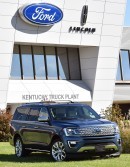It’s true, no one likes a backseat driver. With help from driver-assist technology, it could be that the time of backseat drivers is coming to an end, or so Ford believes.
Based on the findings of a recent research conducted by the automaker, backseat drivers could soon disappear: an overwhelming percentage of them admit they’re more likely to stop nagging and interfering if the car is equipped with driver-assist features. In other words, they may not trust the man or woman behind the wheel that much, but they have complete faith in technology.
Hence, Ford believes the features will eventually silence backseat drivers completely, Digital Trends reports.
“In the Ford-sanctioned study, 68 percent of respondents said they believed driver-assist tech would reduce back-seat driving behavior. Respondents said their confidence in the technology would reduce their perceived need to give their input to drivers,” the publication reports.
To conduct this research, Ford brought in sociologist Dr. Jess Carbino, best known for working with Tinder and Bumble. “Carbino echoed the opinions of the study respondents, saying that driver-assist tech could instill more confidence in passengers and make them less likely to engage in back-seat driving behavior,” adds the same media outlet.
As of 2018, Ford introduced driver-assist technology on all its cars, called Co-Pilot 360 and offering lane keep assist, blind-spot monitoring, autonomous emergency braking and adaptive cruise control. Like in the case of other carmakers, these features can’t work without human intervention, so whether backseat drivers like it or not, they still have to place some faith in the human doing the actual driving.
At least for some time. Ford plans to start production on self-driving cars in 2021, which will be used for delivery and ride-sharing services. Until then, backseat drivers will remain a reality for most drivers, even if slightly less annoying thanks to driver-assist features.
Hence, Ford believes the features will eventually silence backseat drivers completely, Digital Trends reports.
“In the Ford-sanctioned study, 68 percent of respondents said they believed driver-assist tech would reduce back-seat driving behavior. Respondents said their confidence in the technology would reduce their perceived need to give their input to drivers,” the publication reports.
To conduct this research, Ford brought in sociologist Dr. Jess Carbino, best known for working with Tinder and Bumble. “Carbino echoed the opinions of the study respondents, saying that driver-assist tech could instill more confidence in passengers and make them less likely to engage in back-seat driving behavior,” adds the same media outlet.
As of 2018, Ford introduced driver-assist technology on all its cars, called Co-Pilot 360 and offering lane keep assist, blind-spot monitoring, autonomous emergency braking and adaptive cruise control. Like in the case of other carmakers, these features can’t work without human intervention, so whether backseat drivers like it or not, they still have to place some faith in the human doing the actual driving.
At least for some time. Ford plans to start production on self-driving cars in 2021, which will be used for delivery and ride-sharing services. Until then, backseat drivers will remain a reality for most drivers, even if slightly less annoying thanks to driver-assist features.


























